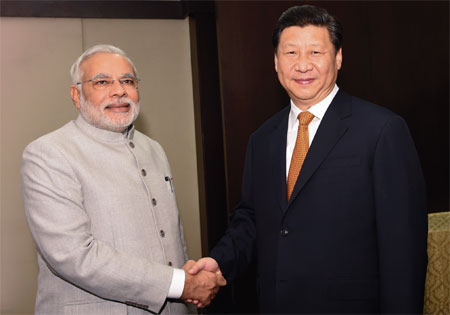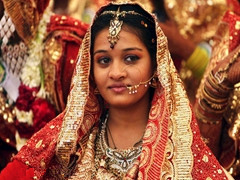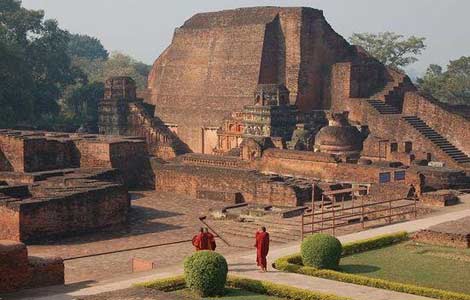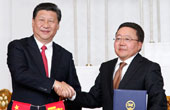Xi meets with India's new PM
Updated: 2014-07-15 11:52
By Wu Jiao in Fortaleza, Brazil and Zhang Yunbi in Beijing (China Daily USA)
Comments Print Mail Large Medium SmallLeaders from China and India held their maiden meeting Monday following the Indian government's recent post-election reshuffle, with President Xi Jinping calling on the two giant Asian countries to be partners rather than competitors.
Observers said the meeting kicked off a good start in building mutual trust between the leaders and will help usher in a new era for the huge economic potential represented by the two emerging economies, which together account for nearly 2.5 billion of the world's population.
During a meeting with India's new Prime Minister, Narendra Modi, Xi said that in the perspective of long-term strategy, China and India should be partners not competitors.
"Joining hands for peaceful, cooperative and inclusive development to enable the 2.5 billion people in both countries live a better life, and to promote the peace and development in the region and the world, is our biggest common interest," Xi said through a translator.
Modi said he had visited China several times as chief minister of Gujarat and was deeply impressed by the Chinese people's hospitality.
"The new India government under my leadership is willing to deepen India-China friendly cooperation. This is quite important for India," Modi said.
The two leaders promised to visit each other's countries in the near future. The 40-minute exchange touched upon a wide range of issues.
On the economic front, Xi called on the two countries to compare notes on their development strategy and build closer partnerships. He advised the two countries to initiate pilot projects in the infrastructure and industrial investment sectors. China also welcomed India's participation in the Asia Infrastructure Investment Bank as a primary participant, Xi said.
Modi said India welcomed Chinese firms investing in India's infrastructure buildup, including the railway sector, and building up industrial parks in India. India was also considering joining the Asia Infrastructure Investment Bank, Modi said.
On the security front, the two sides also promised to peacefully resolve border disputes through negotiation.
Fu Xiaoqiang, a researcher on India studies at China Institutes of Contemporary International Relations, said the first official meeting between the two leaders "greatly facilitates communications in between".
"The meeting is injecting momentum into a thriving cooperation and will provide a driving force for the economic and defense agendas," Fu said.
Since Modi's landslide victory in May, the two nations have demonstrated a high frequency of top-level contact.
In June, Chinese Foreign Minister Wang Yi went to India in the capacity of President Xi Jinping's special envoy to establish high-level contact with the new government.
Indian Vice-President Shri Mohammad Hamid Ansari visited Beijing in late June and said India's new administration "attaches high importance" to the India-China relationship. Indian Army Chief General Bikram Singh paid a visit to Beijing in early July.
Ma Jiali, a researcher with the China Reform Forum, said the fast growing of the China-India relationship is "natural" because stronger ties with New Delhi "serve the very interests of China", including geopolitical and international considerations.
Regarding historic divergences between the two nations, Ma said policymakers on both sides have realized that "a deepening political mutual trust best serves their fundamental national strategies", Ma said.
Beijing regards New Delhi as a heavyweight in global geopolitics, and in view of India, "the vast dividends released by China's reform and opening up signifies huge potentials for India and a major market", Ma said.
Cooperation in building industrial parks in India has been on the table since June when the two nations signed a Memorandum of Understanding.
On the economic and trade front, the two countries are expected to "maximize the advantages of their complementarity" and broaden the scope of economic cooperation, Fu suggested.
Bilateral trade exceeded $65 billion last year, and cooperation in infrastructure construction - including energy and telecommunication - has contributed new highlights, according to Chinese Minister of Commerce Gao Hucheng.
Ye Hailin, a researcher in South Asian studies at the Chinese Academy of Social Sciences, noted that Modi has rich experience in progressively industrializing India's local sectors, and attracting Chinese investment and contractors is an appealing option for India.
"This will prompt the new Indian administration to seek a stable status in advancing economic cooperation with China," Ye said.
|
Chinese President Xi Jinping (right) meets with Indian Prime Minister Narendra Modi in Fortaleza, Brazil on Monday. Li Xueren / Xinhua |
Big Talk







